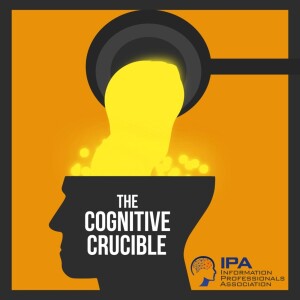
The Cognitive Crucible is a forum that presents different perspectives and emerging thought leadership related to the information environment. The opinions expressed by guests are their own, and do not necessarily reflect the views of or endorsement by the Information Professionals Association.
During this episode, Dr. Tom Ferris discusses his fascinating research related to cognitive ergonomics.
Research Questions: Tom thinks the following questions need additional study:
-
Human sensing and cognitive insights obtrusive physiology; making inferences during human studies; finding ways of measuring workload, stress and emotional workload in humans.
-
Design for what we know about humans; sensing and detecting emotional states and having machines respond accordingly; control science and getting machines to work better based upon human cognitive sensing.
Resources:
-
Cognitive Crucible Podcast Episodes Mentioned
-
-
#71 Hasard Lee on the F-35 and Cognitive Load
-
-
Tom Ferris
-
The Design Of Everyday Things by Don Norman
-
IPA Monthly Brown Bag Meetings
-
Calling Authors & Thought Leaders: LLMs and GPT-3
-
IPA Blog Submission Guidelines
Link to full show notes and resources
https://information-professionals.org/episode/cognitive-crucible-episode-140
Guest Bio:
Dr. Thomas Ferris is an Associate Professor, Industrial & Systems Engineering at Texas A&M University. Dr. Ferris' research interests are in human factors and cognitive ergonomics, and can be described as the study of cognition in human-machine engineered systems. His primary focus involves human information processing and design to support attention and interruption management. In particular, he investigates novel interface design techniques, employing alternative display modalities such as the sense of touch. Other research interests include human error, decision making under time pressure and human-automation interaction. He has interest and experience in applying his research to the domains of medicine (anesthesiology), military operations (command and control, UV control and operations), aviation (cockpit automation and air traffic control) and ground transportation.
About: The Information Professionals Association (IPA) is a non-profit organization dedicated to exploring the role of information activities, such as influence and cognitive security, within the national security sector and helping to bridge the divide between operations and research. Its goal is to increase interdisciplinary collaboration between scholars and practitioners and policymakers with an interest in this domain.
More Episodes
 2021-11-02
2021-11-02
 2021-09-28
2021-09-28
 2021-08-10
2021-08-10
 2021-07-20
2021-07-20
 2021-07-09
2021-07-09
Create your
podcast in
minutes
- Full-featured podcast site
- Unlimited storage and bandwidth
- Comprehensive podcast stats
- Distribute to Apple Podcasts, Spotify, and more
- Make money with your podcast
It is Free
- Privacy Policy
- Cookie Policy
- Terms of Use
- Consent Preferences
- Copyright © 2015-2024 Podbean.com






